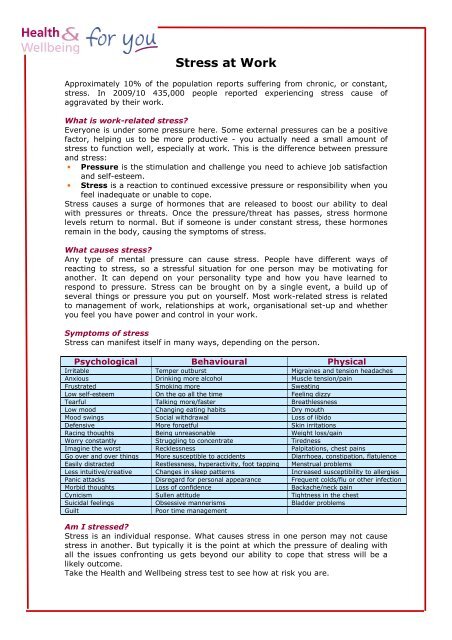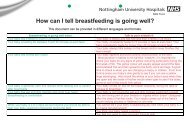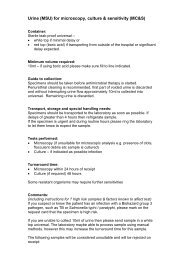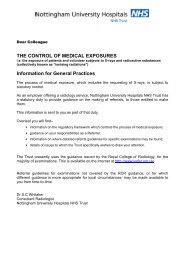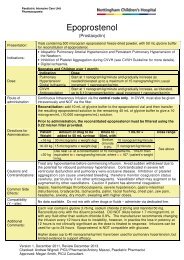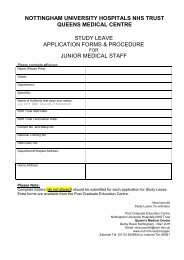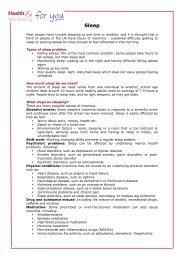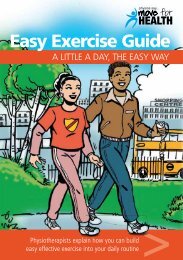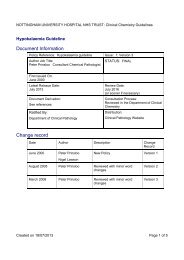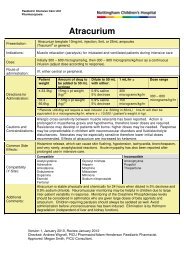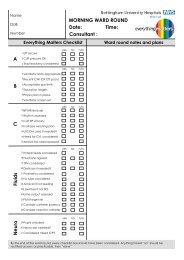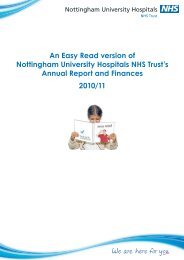Stress at Work
Stress at Work
Stress at Work
Create successful ePaper yourself
Turn your PDF publications into a flip-book with our unique Google optimized e-Paper software.
<strong>Stress</strong> <strong>at</strong> <strong>Work</strong>Approxim<strong>at</strong>ely 10% of the popul<strong>at</strong>ion reports suffering from chronic, or constant,stress. In 2009/10 435,000 people reported experiencing stress cause ofaggrav<strong>at</strong>ed by their work.Wh<strong>at</strong> is work-rel<strong>at</strong>ed stress?Everyone is under some pressure here. Some external pressures can be a positivefactor, helping us to be more productive - you actually need a small amount ofstress to function well, especially <strong>at</strong> work. This is the difference between pressureand stress:• Pressure is the stimul<strong>at</strong>ion and challenge you need to achieve job s<strong>at</strong>isfactionand self-esteem.• <strong>Stress</strong> is a reaction to continued excessive pressure or responsibility when youfeel inadequ<strong>at</strong>e or unable to cope.<strong>Stress</strong> causes a surge of hormones th<strong>at</strong> are released to boost our ability to dealwith pressures or thre<strong>at</strong>s. Once the pressure/thre<strong>at</strong> has passes, stress hormonelevels return to normal. But if someone is under constant stress, these hormonesremain in the body, causing the symptoms of stress.Wh<strong>at</strong> causes stress?Any type of mental pressure can cause stress. People have different ways ofreacting to stress, so a stressful situ<strong>at</strong>ion for one person may be motiv<strong>at</strong>ing foranother. It can depend on your personality type and how you have learned torespond to pressure. <strong>Stress</strong> can be brought on by a single event, a build up ofseveral things or pressure you put on yourself. Most work-rel<strong>at</strong>ed stress is rel<strong>at</strong>edto management of work, rel<strong>at</strong>ionships <strong>at</strong> work, organis<strong>at</strong>ional set-up and whetheryou feel you have power and control in your work.Symptoms of stress<strong>Stress</strong> can manifest itself in many ways, depending on the person.Psychological Behavioural PhysicalIrritable Temper outburst Migraines and tension headachesAnxious Drinking more alcohol Muscle tension/painFrustr<strong>at</strong>ed Smoking more Swe<strong>at</strong>ingLow self-esteem On the go all the time Feeling dizzyTearful Talking more/faster Bre<strong>at</strong>hlessnessLow mood Changing e<strong>at</strong>ing habits Dry mouthMood swings Social withdrawal Loss of libidoDefensive More forgetful Skin irrit<strong>at</strong>ionsRacing thoughts Being unreasonable Weight loss/gainWorry constantly Struggling to concentr<strong>at</strong>e TirednessImagine the worst Recklessness Palpit<strong>at</strong>ions, chest painsGo over and over things More susceptible to accidents Diarrhoea, constip<strong>at</strong>ion, fl<strong>at</strong>ulenceEasily distracted Restlessness, hyperactivity, foot tapping Menstrual problemsLess intuitive/cre<strong>at</strong>ive Changes in sleep p<strong>at</strong>terns Increased susceptibility to allergiesPanic <strong>at</strong>tacks Disregard for personal appearance Frequent colds/flu or other infectionMorbid thoughts Loss of confidence Backache/neck painCynicism Sullen <strong>at</strong>titude Tightness in the chestSuicidal feelings Obsessive mannerisms Bladder problemsGuiltPoor time managementAm I stressed?<strong>Stress</strong> is an individual response. Wh<strong>at</strong> causes stress in one person may not causestress in another. But typically it is the point <strong>at</strong> which the pressure of dealing withall the issues confronting us gets beyond our ability to cope th<strong>at</strong> stress will be alikely outcome.Take the Health and Wellbeing stress test to see how <strong>at</strong> risk you are.
Taking control• One of the most important factors in reducing stress levels is managing timeeffectively. Prioritise tasks, deleg<strong>at</strong>e where necessary, and take care not to takeon more than you can handle. Completing one task before going on to the nextwill help you to feel more in control of work, while varying tasks will help to keepyou interested.• Don’t set unrealistic goals – there are only so many things we can do in one day.Make achievable lists of tasks and don’t be afraid to reschedule or renegoti<strong>at</strong>e.• Take a break! Being busy means we often feel guilty about taking a break, andmany of us e<strong>at</strong> lunch <strong>at</strong> our desks. Taking a break will make you more effectivein the afternoon than if you work through your lunch.• It is helpful to identify which situ<strong>at</strong>ions stress you most. Consider keeping a‘stress diary’ to help you become more aware of the situ<strong>at</strong>ions th<strong>at</strong> lead you tobecome stressed, how effective you are under stress, and help you to developbetter coping mechanisms.• Accept the things you cannot change. Changing a difficult situ<strong>at</strong>ion is not alwayspossible. If this proves to be the case, concentr<strong>at</strong>e on wh<strong>at</strong> you do have controlover.• Learn th<strong>at</strong> it is ok to say ‘no’ sometimes. You cannot do everything for everyoneand must meet your own needs as well as other people’s.<strong>Stress</strong> busting tipsIn order to cope with stress, people often turn to things th<strong>at</strong> are ineffective andunhealthy, such as drinking alcohol, smoking, taking drugs, overe<strong>at</strong>ing, or theymay deny the problem. Instead of these harmful techniques, try one of thefollowing:• Exercise! People who do not exercise 5 times a week for 30 minutes or more arenot fit enough to cope with the physical demands life throws <strong>at</strong> them. It can behard to find the time so be clever and find opportunities – use the stairs insteadof the lift, cycle or walk to work once or twice a week, take a lunch time walk, orcome to an NUH active class before or after work, or during your lunch break. Aswell as the physical benefits, exercising makes your body release serotoninwhich makes you feel happier.• E<strong>at</strong> a well balanced diet – wh<strong>at</strong> you e<strong>at</strong> can affect your mood (see the Food andYour Mood fact sheet), your sleep and your productivity.• When you feel overwhelmed, practice speaking more slowly than usual. You willfind you think more clearly and react more reasonably to stressful situ<strong>at</strong>ions.• Divert your energies into something cre<strong>at</strong>ive such as playing an instrument, art,cre<strong>at</strong>ive writing, acting etc.• Connect with people – activities with friends help us relax and having a laugh isa gre<strong>at</strong> stress reliever.• Tre<strong>at</strong> yourself to a beauty therapy (timetable on the health and wellbeingwebsite).• Learn some basic relax<strong>at</strong>ion techniques (see the Relax<strong>at</strong>ion Techniques factsheet), and make time to relax <strong>at</strong> work by stretching and bre<strong>at</strong>hing deeply. Thiswill help to keep you focussed and prevent tired muscles.• At the end of the day, reflect on wh<strong>at</strong> you've achieved r<strong>at</strong>her than worryingabout future work. Don't be too hard on yourself and remember to take each dayas it comes.Wh<strong>at</strong>ever you find relaxing, make sure th<strong>at</strong> you make time for you. Plansomething rewarding for the end of a stressful day.
Talk to someoneIt can seem hard to confront the causes of workplace stress and to ask for help.Some people may be embarrassed or think they should be able to deal with it ontheir own. But sometimes, support and advice from your line manager or humanresources department is necessary to help you deal with difficulties <strong>at</strong> work, whetherit is to clarify your job role and responsibilities, or to deal with workplace bullying.If you find talking about your concerns difficult, it may help to make notes to bringalong to the work interview with you. Make these clear and specific.Seeking Further Help• Some people need to seek further help for work rel<strong>at</strong>ed stress, as they may bedepressed or have an anxiety disorder th<strong>at</strong> needs tre<strong>at</strong>ment. Anyone concernedth<strong>at</strong> they need help should visit their GP for advice.• There are also courses for stress management and lots of self help resources.Speak to your line manager, Occup<strong>at</strong>ional health or Training and development.Useful websitesHealth and Wellbeing - www.nuh.nhs.uk/healthandwellbeingNHS stress inform<strong>at</strong>ion - www.nhs.uk/Conditions/<strong>Stress</strong>/Pages/Introduction.aspxIntern<strong>at</strong>ional <strong>Stress</strong> Management Associ<strong>at</strong>ion -www.isma.org.uk/about-stress/index.htmlMIND food and mood guide - www.mind.org.uk/foodandmood/


